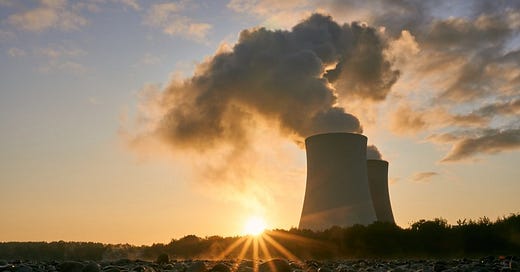DOWN WITH THE SUN
Nuclear power, infinite and inexhaustible, can power an advanced society cheaply and safely. Why have dishonest demagogues terrified a gullible public and crippled this industry?
Robert Zubrin
If you oppose carbon taxes, you will be pilloried as a climate-change denier, but if you oppose nuclear power, you will be warmly embraced by those who call themselves environmentalists. Consider this contradiction carefully. We may understand a great deal about the Green movement by studying it.
Energy is the lifeblood of civilization. Every aspect of our lives depends upon it. Energy makes modern agriculture possible; without energy, we could not dream of feeding the whole world. We need energy to transport our food, to run life-saving machines in our hospitals, to clothe ourselves and to shelter ourselves. It is not just carbon emissions that have risen since the Industrial Revolution. Every measure of quality of life has risen, some of them exponentially. This is no coincidence. The wealthier a country is, the more energy it uses; the relationship is linear.
But more than a billion people on this planet have no electricity, and three billion more suffer from shortages. Lacking electricity is deadly and immiserating. Without reliable electricity, a society can’t escape back-breaking poverty, lower its rate of infant and maternal mortality, or raise life expectancies to the standards of the developed world. Instead, people starve or languish from malnutrition and die of wholly preventable disease.
When considering energy issues, our first concern should be the world’s most pressing moral problem: poverty. Roughly a billion of our fellow human beings live on less than a dollar day. If you have never been to a place where people are that poor—this kind of poverty does not exist in any Western country—you can only imagine it; you cannot fully grasp what it means. The existence of poverty so dire, in the modern world, is a crime. It is the world’s most serious human rights crisis. Abundant, inexpensive energy is the remedy.
When politicians speak of raising the cost of energy by, for example, levying carbon taxes, keep in mind that the people most severely penalized when the cost of energy rises are not the citizens of wealthy countries, but the poorest people in the world. If ending poverty does not weigh on your mind as a high moral priority, it is either because you don’t truly understand the suffering and indignity it represents or because you are morally insensate.
Keep reading with a 7-day free trial
Subscribe to The Cosmopolitan Globalist to keep reading this post and get 7 days of free access to the full post archives.






